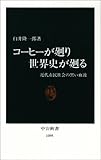John McHugo*1 “Coffee and qahwa: How a drink for Arab mystics went global” http://www.bbc.co.uk/news/magazine-22190802
珈琲という飲み物の歴史のお温習い。
珈琲の木が最初に栽培されたのは(エチオピアではなく)イエメン。また初期の珈琲とスーフィズム*2との結び付きも留意しておくべきだろう。
Although a beverage made from the wild coffee plant seems to have been first drunk by a legendary shepherd on the Ethiopian plateau, the earliest cultivation of coffee was in Yemen and Yemenis gave it the Arabic name qahwa, from which our words coffee and cafe both derive.Qahwa originally meant wine, and Sufi mystics in Yemen used coffee as an aid to concentration and even spiritual intoxication when they chanted the name of God.
By 1414, it was known in Mecca and in the early 1500s was spreading to Egypt from the Yemeni port of Mocha. It was still associated with Sufis, and a cluster of coffee houses grew up in Cairo around the religious university of the Azhar. They also opened in Syria, especially in the cosmopolitan city of Aleppo, and then in Istanbul, the capital of the vast Ottoman Turkish Empire, in 1554.
イスラーム世界における反珈琲論の根拠のひとつには公共空間としてのコーヒー・ハウスがモスクの権威を脅かしかねないということがあった。
Coffee houses were a new institution in which men met together to talk, listen to poets and play games like chess and backgammon. They became a focus for intellectual life and could be seen as an implicit rival to the mosque as a meeting place.Some scholars opined that the coffee house was "even worse than the wine room", and the authorities noted how these places could easily become dens of sedition. However, all attempts at banning coffee failed, even though the death penalty was used during the reign of Murad IV (1623-40). The religious scholars eventually came to a sensible consensus that coffee was, in principle, permissible.
ウィーン*3への珈琲の伝来;
オスマン帝国は軍楽隊*4とともに珈琲をウィーンにもたらしたことになる。
Austrian coffee drinking is said to have received a big boost when the Turkish siege of Vienna in 1683 was broken, and the European victors captured huge coffee supplies from the vanquished.Perhaps that is why, to this day, coffee is served in Vienna with a glass of water - just like the tiny cups of powerful Turkish coffee with its heavy sediment in Istanbul, Damascus or Cairo. Is this just a coincidence, or a long forgotten cultural borrowing?
土耳古珈琲という言い方はおかしいという話;
珈琲の歴史については、臼井隆一郎『コーヒーが廻り世界史が廻る』あり。
The beverage we call "Turkish coffee" is actually a partial misnomer, as Turkey is just one of the countries where it is drunk. In Greece they call it "Greek coffee", although Egyptians, Lebanese, Syrians, Palestinians, Jordanians and others do not seem to care overmuch about the name.

コーヒーが廻り世界史が廻る―近代市民社会の黒い血液 (中公新書)
- 作者: 臼井隆一郎
- 出版社/メーカー: 中央公論社
- 発売日: 1992/10/01
- メディア: 新書
- 購入: 3人 クリック: 26回
- この商品を含むブログ (32件) を見る
*2:See also http://d.hatena.ne.jp/sumita-m/20060824/1156417435 http://d.hatena.ne.jp/sumita-m/20061020/1161323567 http://d.hatena.ne.jp/sumita-m/20070418/1176869274 http://d.hatena.ne.jp/sumita-m/20070927/1190866367 http://d.hatena.ne.jp/sumita-m/20090403/1238775017 http://d.hatena.ne.jp/sumita-m/20090716/1247720308 http://d.hatena.ne.jp/sumita-m/20100301/1267380159 http://d.hatena.ne.jp/sumita-m/20110522/1306007916
*3:See eg. http://www.bbc.co.uk/news/magazine-21859771 http://d.hatena.ne.jp/sumita-m/20130418/1366252254